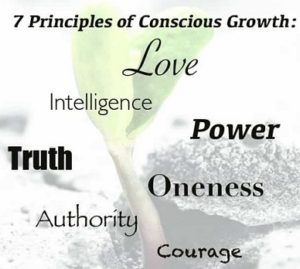Conscious growth
Love the life you have… create the life you love. Perhaps the most important realization that an individual can make in their quest for personal and conscious growth is that there is no single formula that defines the path to personal success.
We all have different goals and priorities, which means that different activities and attitudes will make us feel good about ourselves. We also have different natural strengths and weaknesses that are a part of our inherent personality type. How then, as individuals, can we feel successful in our lives?
 Part of conscious growth is understanding what’s important to you
Part of conscious growth is understanding what’s important to you
Each personality type has a different idea of what it means to be successful. Self-knowledge is one common goal that will help everyone achieve personal success. So many people are hung up on somebody else’s idea of what it means to be successful, and they are unaware of what is truly important to them.
This is completely normal. We all have important role-models and influencers in our lives who may have basic values that are quite different from our own. If this is the case, it’s important to recognize that the discrepancy between what we have been taught is truly important and what we personally believe to be truly important is due to a difference in perspective.
If we spend our time and effort trying to meet somebody else’s idea of success, and ignore or belittle any conflicting messages from our own psyche, then we will find ourselves exhausted and unhappy. Realizing what is truly important to us is a major step towards achieving personal success.
Recognize your weaknesses without hiding behind them
While improving our self-knowledge and realizing our true goals can be very liberating, we should not discard the rules of the society in which we live. We must recognize that other people’s value systems are no less important than our own. And we must recognize and accept that we live in a society in which certain personality types and behaviors are more suited towards particular tasks. This is the second key that will open the door towards personal growth.
For example, there are situations in which it is more appropriate and effective to show compassion and caring (Feeling), rather than impersonal logic (Thinking). Likewise, there are situations that call for using impersonal logic to make a decision, in which the more subjective viewpoint of the Feeling function is inappropriate and ineffective.
Persons with a preference for Feeling will have a natural advantage over Thinkers in situations that require compassion and awareness of other’s emotions. Conversely, persons with a preference for Thinking will have a natural advantage over Feelers in situations that require the ability to make a decision based on impersonal data.
As we learn about our personality type and the types of others, we are empowered with an understanding of why people react differently in different situations. When put into the context of Psychological Type, we can better accept best online casino and understand people’s behaviors that are different from ours. These insights are extremely useful and powerful to us as individuals.
However, if we are concerned with growing as individuals, we must take care not to use personality type as an excuse for our inappropriate behavior. While it’s powerful and useful to notice that another person’s inappropriate behavior may be due to their personality type, we cannot use the same reasoning on ourselves.
We should recognize that our personality type has weaknesses, but we must use that knowledge to conquer those weaknesses rather than to excuse poor behavior. We cannot be responsible for other people’s behavior, but we can control our own.
Accordingly, if we notice that someone seems to be unable to make an impersonal decision that is isolated from human perspective, we should say to ourselves, “Ah ha, here is a Feeler. This person does not use Thinking well, and that is why they’re behaving this way.”
Yet when we as Feelers are presented with a situation that requires an impersonal approach, we should NOT say to ourselves “I am a Feeler, and can’t be expected to make decisions based purely on impersonal facts and logic.” This kind of rationalization for behavior is certainly an easy way out of a situation, but it enforces the weakness, making it weaker and weaker still.
Strive for Balance
Most of the weaknesses associated with any given personality type are a result of that type’s dominant function overtaking the personality to the extent that the other functions become slaves to the dominant function. Although it is natural for every personality to be ruled by its dominant function, it becomes a problem when the supporting functions are not allowed to develop fully on their own because they are too busy “serving the master”. In such cases, a personality can become quite imbalanced.
A situation in which the dominant function of a personality completely overshadows the other personality functions is analogous to a kingdom that is ruled by an overbearing king who requires absolute servitude. Imagine such a king sitting down to dinner in his castle. He keeps all of his servants running about to bring him dinner, and requires that they serve him fully (disregarding their own needs) until he is completed sated.
His Foreign Minister, who is expected at an important affair at a neighboring kingdom, finds himself pouring ale. His Minister of Domestic Affairs, rather than addressing the issue of a failing economy, slices roast turkey. His staff grabs food for themselves here and there, but never get what they really need or want, and are consequently unsatisfied, malnourished, and underdeveloped.
The issues that the staff should be taking care of are left undone, because they never finish their primary task of serving the king. The king’s immediate needs are being met, and so he is tolerably happy, but he is an ineffective king. As far as he knows, everything and everybody exists simply to serve him. He has no concept of Success beyond his daily needs. Since he cannot see beyond his own needs, the entire kingdom suffers.
Likewise, a personality that has developed with a goal of serving the dominant function above all other considerations often results in a person who is imbalanced. In severe cases, the weaknesses associated with the given type are often quite apparent to others, and overshadow the individual’s natural strengths.
Such a drastic imbalance is not common, and may be the result of continuous and extreme stress. Most people will experience times in their lives during which they are stressed to the point of serious imbalance. People who experience this constantly have issues that need to be dealt with, and should seek help.
Much more commonly, we see individuals who exhibit both the strengths and weaknesses of their type. It is natural and healthy that each personality type is ruled by a dominant function, and that the other functions support the ruling function. We don’t seek to change anyone’s natural self, or to achieve a perfect balance amongst a personality’s functions.
By definition, a kingdom needs a king in order to exist, and a personality needs a dominant function. However, a kingdom with a well-developed and effective king (the dominant function), who has well-trained and educated advisors (the supporting functions), will thrive more than the kingdom ruled by a neglectful king who is supported by inexperienced advisors.
As we can see, Balance and Success are relative terms. One statement using these terms is true for all types of personalities: Balance is the key to Success.
Opening the Door
So how do we go about realizing what’s truly important to us? How do we recognize our weaknesses, and learn not to hide behind them? How do we become balanced? How do we open that magical door that will show us the way to personal growth and success?
There is no quickie scheme that will make you a successful person. Psychological Type is a powerful aid in our quest for excellence, but it is not the actual solution. It is a model that will help you to expand your understanding of human nature.
An improved understanding of yourself and others will help you to find, follow or expand your path. An awareness and acceptance of the fact that one personality function may be more effective than another function in a given situation will help you to understand the relevance of personal growth to your life.
Carl Jung identified a process of personal growth that he called individuation, which is essentially the conscious realization of your true self, beyond the persona that is presented by your conscious self. Our efforts to help people develop themselves is essentially the effort to help them to realize that their personal perspectives and conscious ideas are only a small part of who they are, and that the more they try to develop and defend this superficial “self”, the further they get away from their true Self.
This realization helps a psyche in many concrete ways, and is also a positive step towards promoting a psyche that is open to the process of individuation. For the purposes of making this realization accessible to the general public, our writings are mostly void of complex theoretical discussion.
We live in a world of paradox , where things are seldom as they appear. We witness events or encounter evidence that doesn’t make sense, or that seems contradictory, ugly, or painful. As a result, some become jaded realists, while others shut their eyes and escape into a private world of fantasy or despair.
A few, however, somehow find a way to remain awake and engaged, and are able to reconcile and even redeem the inevitable contradictions and setbacks of life. Thus, they find a way to experience true peace, happiness, love, beauty and stability. All the great mysteries of life are paradoxes: life & death, spirit & matter, real & unreal. These all must be faced squarely if one is to find true repose. How is this done?
Become enlightened and empowered…
We are attempting to become Masters of our own lives… to become enlightened and empowered. All of us are at different steps on the staircase, or at different paces down the road. But we are beginning the journey and doing well! We must continue to grow if we are to succeed and truly become Masters of Light. As we become a Master, we are able to help humanity. The three most important stages of Enlightenment are to know your Self, perfect your Self, and Empower Others.
Know your Self
As a potential Master you must know yourself. If you believe you are greater than you are, then you become arrogant and vain! Or if you believe you are lesser than you are, you cannot help and teach others. You need to become an independent observer of your behavior. You must step outside of your Self. Begin to look at yourself objectively to see your faults and virtues. Increase the virtues within you and work on changing the faults!
Many people believe that it is loveable to have a few faults. They may think it is alright to be a little lazy or a little impatient. But if these same qualities were in a Master, you would be very critical of this! You would not like a Master to be arrogant, vain, selfish, lazy, or to anger easily. And if you to are to become a Master of Light, then you need to begin to truly look at your Self. Begin the process of perfecting your Self.
Perfect your Self
Perhaps you will not gain 100% perfection in this Life, but you can certainly begin the process! Be courageous enough to truly look at your faults and see how you stop the Light from coming in. Think of yourselves as a mighty Lighthouse. A Lighthouse protects little ships at sea from crashing on the rocks.
There they stand, mighty and proud, with a beautiful Light within. But if the windows of the Lighthouse are covered with debris, then the Light cannot shine out! And this is the same with you. Look at your faults and work on them. Shine your windows and then your own Inner Light can save others from crashing on the rocks!
Begin to be kinder, more humble, but at the same time use the strength within you to work toward the Light. Become a source of unconditional love. If you can see patterns in your life that have been destructive in the past, reach deep within and change them. In the future you can teach others how to release themselves from these patterns.
Examine your body, mind, and soul. Work on all three areas to perfect yourself. Begin the process, for this is why you have incarnated! So that you can perfect yourselves on all levels.
Empower others
By empowering others, you empower yourself. By teaching others, you teach yourself. By healing and counseling others, you heal and counsel yourself. This work is done out of unconditional love. As others become full of Light, your Light increases, too. But you cannot empower others if you do not know yourself. Start to perfect your inner Being. Your light will radiate as you begin to teach from the heart!
Love yourself
There are many ways to Love yourself. Everything that happens to you is an opportunity to have a loving experience. When things seem to be going against you, they are showing you areas that require more Love. Send Love to those inner places which need it most. Love means accepting yourself as you are right now.
There are no exceptions to this contract. It is an agreement to appreciate, validate, accept, and support who you are right now. Many regret the past. They think about times when they might have handled a situation in a higher way.
Others look to the future to make who they presently are, inadequate. The past can assist you in remembering times you have succeeded. And the future can be your friend if you learn to envision it as your next step of the journey. Do not make your self wrong because you have not yet achieved your vision. Validate and Love your Self at this moment.
Making comparisons
One of the ways to Love your Self more is to stop comparing yourself to others. Although you are part of a whole, you are also an individual Self with your own Path. Sometimes you are told things that do not resonate with your Inner Being (i.e. “It is good to meditate.”) The challenge of loving the Self is to step aside from everything you are told and ask, “Does this fit me? Does this bring me joy? Do I feel good when I do it?” There is a temptation to make something outside yourself decide what is “right” for you, such as a book or authority figure. Listen to your Inner Truth. Ultimately, it is your own experience that counts.
Feelings of guilt
Another way to Love your Self is to release feelings of guilt. People may want you to think and act in ways that fit their idea of what is correct or incorrect behavior. One way for others to gain control over you is through guilt, anger, or withdrawal of Love. Parents might use these tactics to dominate their children. When you feel strong and in control of your life you can come from the Heart. You do not need to engage in power struggles or make excuses for your behavior. Give your subconscious the message that you are acceptable. In making your Self acceptable, you give others the freedom to Love themselves, too.
Forgiveness
A third quality of Self Love is forgiveness. If there is anything you are hanging onto, an anger, a hurt, a negative feeling about another, then you are keeping it in your aura. The person you are angry at is affected, but not as much as you will be. Negative energy that is part of your aura attracts more negative energy. Forgiveness cleanses and heals your aura.

